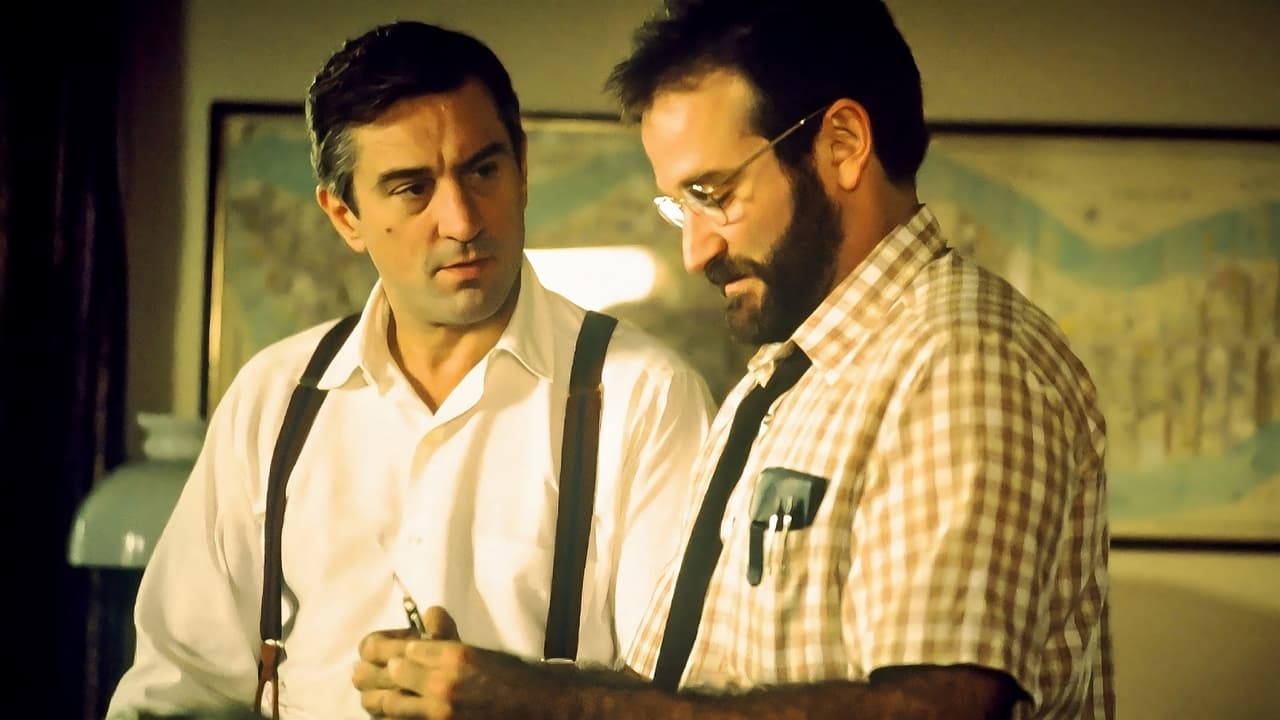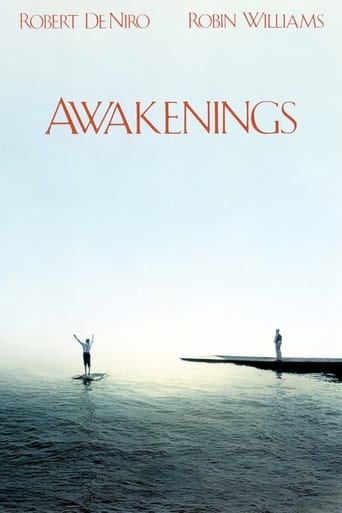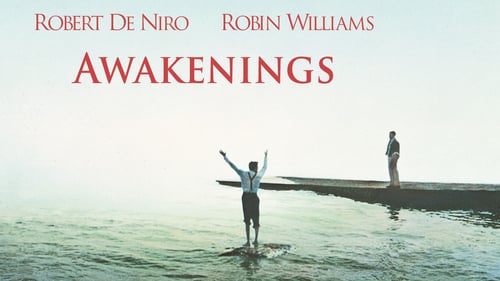



An Exercise In Nonsense
I gave this film a 9 out of 10, because it was exactly what I expected it to be.
View MoreIn truth, any opportunity to see the film on the big screen is welcome.
View MoreThis is a dark and sometimes deeply uncomfortable drama
View MoreOne of the Best Movies! Perfect proof of the proverb Old is Gold. There wasn't a second when i turned my head away while watching the movie. THIS MOVIE TRULY MAKES YOU REALIZE NEVER TAKE ANYTHING FOR GRANTED. 'APPRECIATE EVERY SMALL THING IN YOUR LIFE'. Not sure why is it not in IMDB Top 10 movies. Brilliant acting by Robin Williams and Robert De Niro keeps you immersed till the end. This Movie taught me that Watching yourself failing everyday is truly Heartbreaking.Thankyou Sagarnair6
View MoreMovie Review: "Awakenings" (1990)When real-life Neurologist Oliver Sacks M.D. (1933-2015) presents his essays on treating a rare neurological brain-infecting virus that completely shuts down the motoric as sensual systems by alternating the human immune system, which had been fulminate adapted by screenwriter Steve Zaillian, who eventually gets recognized for his decisive as well-researched material into cinematic dramatizations, which director Penny Marshall, who in her own right just departed from a huge hit at the U.S. domestic box offices with "Big" starring Tom Hanks, at age 31, when here Robert De Niro, playing the Encephalitis-infected patient Leonard for three decades in coma-like state of no-interaction with any opposite human beings, and Robin Williams with gentle-retreats of a compassionated Doctor Malcolm Sayer as synonym for off-screen credited Oliver Sacks.Together, alongside with "state of the art" cinematography of no further experiments, but perfectly-received coverage and an realistically-designed Mental Institution environment of 1969 in New York City's outcasting borough of the Bronx, cast and crew find a balanced picture, where any medically-as-humane interested spectator can witness at least on-screen, what it is means to live with utmost life-threatening conditions, when medication, here at that time newly develop neurotransmitting-dopamine (drug) wakes the brain-virus-infected patients for the time being, in witnessing action beats by Robert De Niro as Leonard, who runs through a full cycle of emotions of being completly rehabilitated to shrink under the pressures of life itself, while meeting as caring people all-around with suspense-peaking as heart-breaking scene of dancing with Penelope Ann Miller as Paula under slight hints of a highly-emotional soundtrack by Randy Newman.© 2018 Felix Alexander Dausend (Cinemajesty Entertainments LLC)
View MoreAwakenings is, both the happiest and saddest film I have ever seen. It is an emotional roller coaster. It is beautifully filmed. Robert De Niro and Robin Williams are exceptional in this movie. I have never reviewed a film before, but this one was so powerful I felt obliged to let others know. I'm not overly emotional but this one had me holding in the tears with a knot in my throat. It takes an exceptional film to do what this one does to you. There are a lot of meaningless ones out there, I wouldn't even call some of them films, but THIS is A FILM WORTH WATCHING.10/10
View More"People have forgotten what life is all about. They've forgotten what it is to be alive. They need to be reminded."Following the huge success of her 80's comedy, Big, director Penny Marshall decided to approach a much more sensitive and serious subject matter in her next film based on Oliver Sacks' semi-biographical book about his work in a ward with patients in catatonic state. Robin Williams was cast to play Dr. Sacks, although the character's name was changed to Dr. Malcolm Sayer, a shy doctor who prior to have been hired at the ward had very little experience working with patients. He was obsessed with researching and doing lab work, but those skills came in handy when he began treating the catatonic patients at the ward. He discovered that several of the patients that had been in the ward for decades had one thing in common: they had survived a rare form of encephalitis, but the disease left them in their current catatonic state. Most of the doctors believed there was no treatment for these patients, but he began to discover that some of them responded to certain stimuli. Not giving up on them, he decides to attend a lecture where he discovers a new drug that had been effective on patients suffering from Parkinson's, and he believes it might just help awake his patients as well. Casting Robin Williams for the role and having released this only two years after the commercial success of Big, one could easily have expected this to be a comedy, but casting Robert De Niro as the other lead easily put to rest that assumption. De Niro had also worked on Goodfellas the same year as this and he continued to be at the prime of his career. In Awakenings he plays Leonard Lowe, one of the patients who has remained in the same state for nearly four decades and who is still being cared for by his mother, Mrs. Lowe (Ruth Nelson), at the clinic. With the approval of the other doctors at the ward and Leonard's mother, he is chosen for a trial run with the drug. It doesn't take too long for Dr. Sayer to see the results he was expecting as Leonard seems to wake up from his catatonic state. The two begin to form a special bond and the positive results induce Sayer to test the drug on the rest of the patients in the ward in a similar way. As we become witnesses of Leonard's awakening we also begin to see life through his eyes as someone who feels he has lost so many years and now wants to enjoy life to the fullest. His awakening serves the reclusive Doctor as a reminder to begin living life and enjoying human interaction. There is a sub plot revolving his relationship with a nurse from the ward played by Julie Kavner, but the main theme is Sayer's relationship with these patients. Marshall's film was nominated for Best Picture, and just like her previous movie it also earned a nomination for the lead actor, De Niro. De Niro does a superb job playing this awakened catatonic patient, and it is evident that he did his homework and studied every single facial and body tic of the real patients. Sacks had filmed his patients in real life during their awakening periods and so there was a lot of material they had to work with. Robin Williams plays a much more restrained character than what we were used to seeing him do, so his performance might not seem as delightful as his other films but he delivers a solid dramatic turn. The third nomination that the film received was for Steven Zaillian's adapted screenplay which was powerful. He didn't win the Oscar for this film, but he went on to win it two years later for his work in Schindler's List. Spielberg said it was his adaptation in Awakenings that earned him the job for his film. This movie is emotional and touching without being manipulative because it sticks to the true story which was definitely one that had to be told in the big screen. http://estebueno10.blogspot.com/
View More